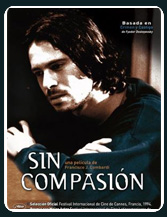
Without Compassion (Sin Compasión, in Spanish) is based around the famous Fyodor Dostoyevsky novel, Crime and Punishment. While there are some changes to the story line, as in any movie adaptation, Sin Compasión follows quite closely to the book mainly making changes to account for the setting Lima in the 1990s in place of nineteenth century Russia.
The film starts with the main character, Ramón Romano, entering a church in order to confess to a priest, the first major deviation from the novel to add in the Catholic element of Latin America. As the story develops, the viewer is offered an insight into Ramón’s life and is gradually given an explanation as to why the young university student would commit such as hideous crime.
Both Ramón’s experiences living in the slums and with the lives of those he meets – in particular, Sonia, a girl forced into prostitution to support her family – are presented as reasons for his crime along with the values of the society in which he lives.
The movie follows Ramón on a journey as he comes to terms with what he has done resulting in a change on his outlook at life. As his relationship with Sonia grows, Ramón manages to turn the page and begins to learn what it means to live selflessly and to consider others.
La película comienza cuando el protagonista, Ramón Romano, entra a una iglesia para confesarse con un sacerdote, este es el primer cambio importante de la novela, ya que agrega el catolicismo de América Latina. A medida que la historia se desarrolla, el público se hace una idea de la vida de Ramón y poco a poco va entendiendo por qué el joven universitario podría cometer un crimen tan horrible.
Tanto las experiencias de Ramón de su vida en los barrios pobres como las vidas de aquellos con los que se encuentra – en particular, Sonia, una joven que se ve obligada a ejercer la prostitución para mantener a su familia – se presentan como las razones de su crimen, junto a los valores de la sociedad en la que vive.
La película sigue a Ramón en un viaje durante el cual se va reconciliando con lo que ha hecho, lo cual resulta en un cambio en su visión de la vida. A medida en que crece su relación con Sonia, Ramón logra pasar la página y empieza a aprender lo que significa vivir desinteresadamente y considerar a los demás.
SPANISH LESSON
Ramón logra pasar la página y empieza a aprender lo que significa vivir desinteresadamente…” “(Ramon manages to turn the page and start learning what it means to live selflessly…”)
“Pasar la página” literally, “turning the page”, means leaving something behind, try to forget, give up something and move on, walking forward. This expression is often used after a broken heart due to a tragic, painful or traumatic situation.
Example: “Después del disgusto que tuve con Silvia, decidí pasar la página y olvidarla”. (“After the disappointment I had with Silvia, I decided to turn the page and forget her”.)